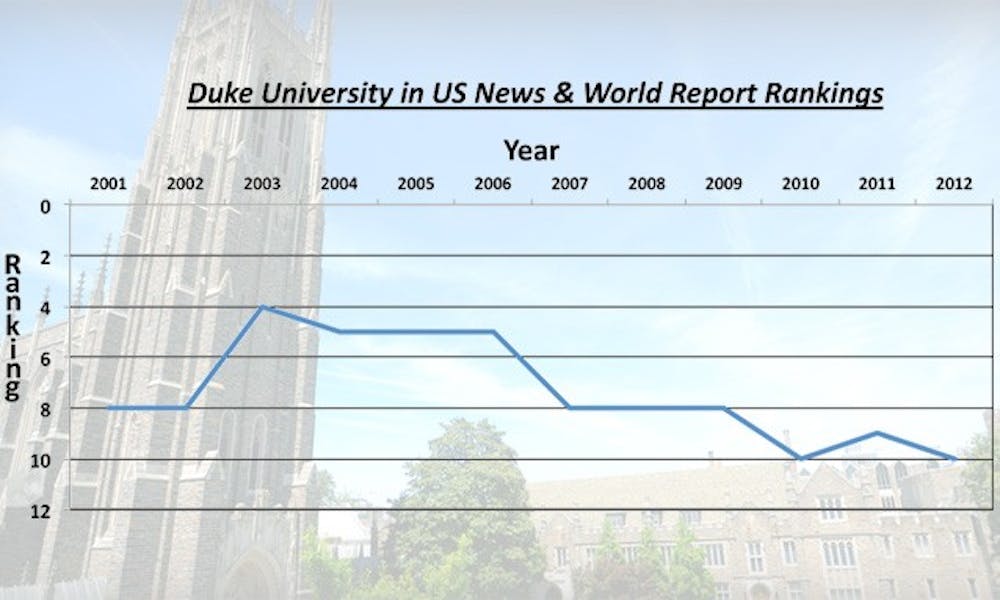After a fleeting rise in the U.S. News & World Report rankings, Duke has returned to No. 10—its lowest position in a decade.
According to the 2012 rankings released Tuesday, Duke dropped from No. 9 last year to No. 10—the same position it held two years ago. In the 2011 rankings, Duke shared ninth place with University of Chicago and Dartmouth College, but this year it was ranked alone, following a five-way tie for fifth place.
Regardless of where the University is ranked, rankings are not a large factor for potential Duke applicants, Director of Undergraduate Admissions Christoph Guttentag said.
“I will say that in the 19 years that I’ve been here, I can’t remember the last time a student or parent who I’ve met has mentioned the rankings,” Guttentag said. “We know that this is something that sells magazines. We know that there’s always chatter in the media about rankings.”
Guttentag said even though the rankings themselves do not provide much information to potential students, the raw data used to compile the rankings could be helpful if it were given to students on a CD-ROM along with the print edition. Students could then weigh that data according to what factors they think are important in schools.
Freshman Jackie Pfeiffer said the U.S. News rankings had no effect on her decision to attend Duke.
“I don’t think those rankings are that accurate, and I don’t think it should affect your decision,” Pfeiffer said. “There’s so much that’s more important than numbers.”
Senior Alex Sloan said he does not put much stock in the rankings though he realizes that others do.
“I know that a lot of people take them seriously and read a lot into them,” Sloan said. “They have to shake them up every year just to get people to read them.”
Sloan has worked as a developer in The Chronicle’s online development department.
Duke’s weighted composite score—the score which determines the overall ranking—was 92, two points higher than last year. The five universities that tied for fifth place scored a 93.
U.S. News said it ranks universities using up to 16 indicators of academic excellence, with the factors that the magazine views as most important weighted more heavily. These factors include acceptance rates, how many people return after freshman year and undergraduate academic reputation.
Harvard, Princeton and Yale universities received the top three spots, with Harvard and Princeton tied at No. 1 for the second year in a row. Most of the same universities have been in the top 10 for the last several years.
The rankings, however, can give a false sense of precision about qualities that are difficult to measure, said Michael Schoenfeld, vice president for public affairs and government relations.
“All rankings like this do is confirm the conventional wisdom,” Schoenfeld said.
He added that administrators do not believe a small change in year-to-year rankings affect the University’s overall reputation or applicant and alumni relations.
“Applications, the quality of students who come here and their academic records, yield, fundraising—all those metrics, we see no impact,” Schoenfeld said.
The Pratt School of Engineering also slid in this year’s rankings—coming in at No. 31. Last year, the school tied for No. 22, rising from No. 26 in the previous year. Duke’s biomedical engineering program remained in the top five—ranked No. 3 this year and No. 2 previously.
Get The Chronicle straight to your inbox
Signup for our weekly newsletter. Cancel at any time.

